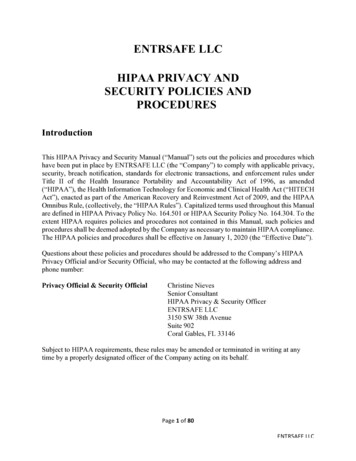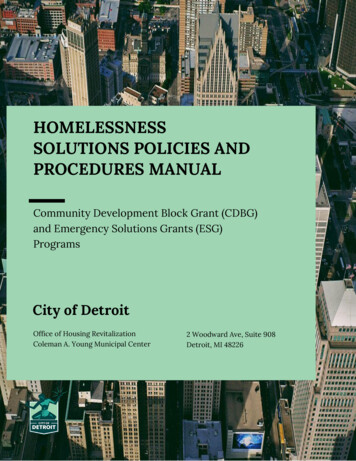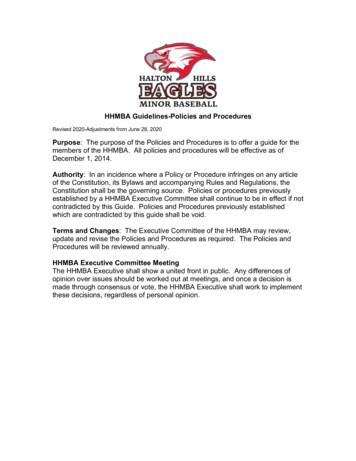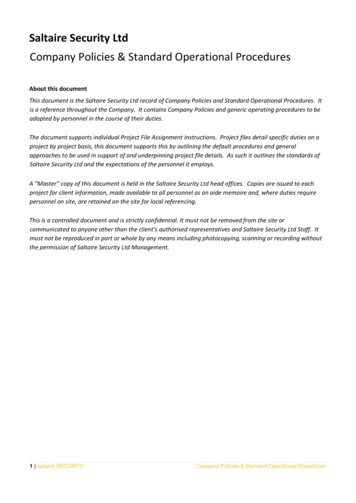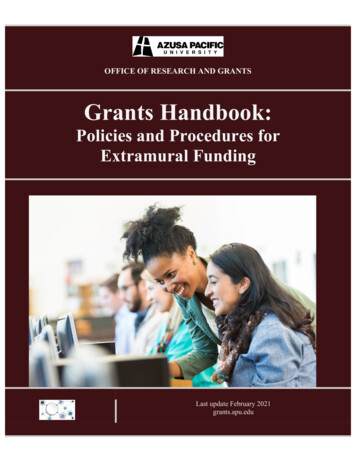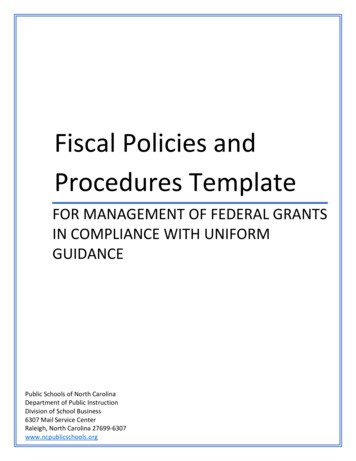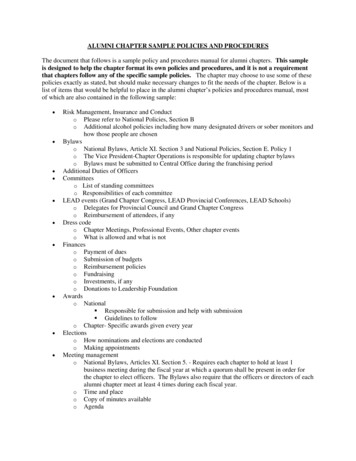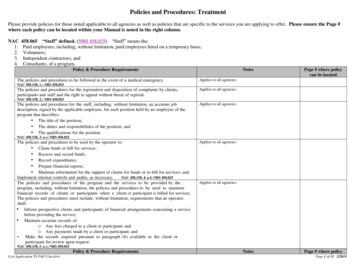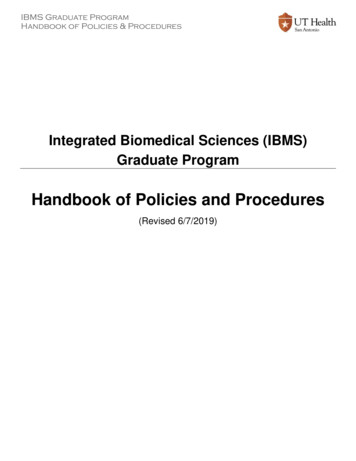
Transcription
IBMS Graduate ProgramHandbook of Policies & ProceduresIntegrated Biomedical Sciences (IBMS)Graduate ProgramHandbook of Policies and Procedures(Revised 6/7/2019)
IBMS Graduate ProgramHandbook of Policies & ProceduresPrefaceThis Handbook is designed 1) to describe the academic and administrative structure that servesas the framework for the Integrated Biomedical Sciences (IBMS) Graduate Program, and 2) todefine for IBMS Ph.D. students and faculty mentors the mechanics for meeting theprogrammatic expectations and achieving the milestones required for graduation.As noted in the figure to left, the IntegratedBiomedical Sciences (IBMS) GraduateProgram is a Ph.D.-granting program in theGraduate School of Biomedical Sciences(GSBS) of UT Health San Antonio. Severalhundred faculty members from throughout6 basic science departments of the GSBS, aswell as from several clinical departmentsand off-campus institutions, are members ofthe IBMS program. Each year, students areadmitted into the IBMS Graduate Program.Based on the research interests ofindividual members of the IBMS GraduateFaculty, seven thematic “disciplines” havebeen designated that provide a structureand mechanism to foster interactions andfacilitateteachingandresearchcollaborations among faculty members andstudentswithcommoninterests.Therefore, each faculty member has anBiology of Aging (BA)Cancer Biology (CB)Cell Biology, Genetics & Molecular Medicine (CGM)Biochemical Mechanisms in Medicine (BMM)Molecular Immunology & Microbiology (MIM)Neuroscience (NS)Physiology & Pharmacology (PP)affiliation with one or more IBMS discipline(s).Each IBMS graduate student is a member of the IBMS Graduate Program and has access to allofferings of the Program, regardless of discipline affiliation. However, all students are requiredto identify one of the disciplines of the Program as their “primary discipline-of-interest”, andas such will follow a particular core curriculum, or Plan of Study, provided by the executiveleadership of the chosen discipline. This core curriculum can accommodate certainmodifications so as to most closely serve the needs of the student. Assurance thatprogrammatic guidelines are met by IBMS graduate students is the primary responsibility ofthe IBMS Committee on Graduate Studies (COGS). Appropriate coordination andcommunication is in place to ensure that discipline activities remain consistent with theexpectations and requirements of the IBMS Graduate Program.The 3 sections included in this Handbook describe: 1) The administrative structure of the IBMSGraduate Program pertinent to both students and faculty; 2) The processes and procedures forall IBMS students to meet graduation requirements; and 3) Guidelines that are customized toensure that the discipline-specific educational needs of students are met.2
IBMS Graduate ProgramHandbook of Policies & ProceduresTable of ContentsPAGE23PREFACETABLE OF CONTENTSI. ORGANIZATIONAL STRUCTURE OF THE IBMS GRADUATE PROGRAMA. Program Director Assistant Program DirectorB. COGS ChairC. IBMS Committee on Graduate Studies (COGS) Membership Responsibilities COGS MeetingsD. Thematic Disciplines Discipline Membership Responsibilities Internal Organization and Function of Each DisciplineE. IBMS Graduate Faculty Membership and Appointment Rights and Responsibilities Additional Discipline Affiliations Declared After Initial AppointmentF. IBMS Student Recruitment Committee Membership Responsibilities Discipline-specific Recruitment ActivitiesG. IBMS Student Admissions Committee Membership ResponsibilitiesH. IBMS Curriculum Committee Membership ResponsibilitiesI. Council of Chairs Membership ResponsibilitiesJ. IBMS Student Council Membership ResponsibilitiesK. IBMS Council of Discipline Coordinators Membership ResponsibilitiesII. STUDENT PROGRESSION/SEQUENTIAL PROCEDURES OF THE IBMS GRADUATE PROGRAMA. Milestone and Compact Agreements Between Graduate Students and Their Dissertation MentorsB. Plans of Study and IBMS Coursework - Overview Year 1 Fall semester Year 1 Spring semester Year 2 Years 3-5 Final HoursC. Laboratory RotationsD. Selection of IBMS Discipline and Dissertation MentorE. Temporary Supervising CommitteeF. Qualifying ExaminationG. Admission to Candidacy for the 2121212121213131414141415151515151616
IBMS Graduate ProgramHandbook of Policies & ProceduresH. Dissertation Research and the Student’s Dissertation Supervising Committee Overview Formation and Membership of the Dissertation Supervising Committee Preparation and Approval of the Dissertation Research Proposal Enrolling for Dissertation Credit (IBMS 7099) Meetings of the Dissertation Supervising Committee Writing the Dissertation and Registering for Final Hours Defense of Dissertation- Public Seminar- Closed-door Defense- Approval of Written Dissertation I.J.K.L.M.N.O.P.Q.R.S.21Registering In Absentia (INTD 1000)Evaluating Student Academic Progress Grade Point Average “Satisfactory/Unsatisfactory" Coursework Qualifying Examination Outcomes Research/Academic Progress Research Committee Meetings Expected Time-to-Completion of Degree RequirementsWithdrawal or Leave of Absence (LOA) from the IBMS Graduate ProgramChange of Degree Objective – Ph.D. to M.S. Voluntary change of degree objective Mandatory change of degree objective ProcedureChange of Dissertation MentorDissertation Mentor Leaves UTHSARelationship between IBMS Graduate Program and D.D.S/Ph.D. and M.D./Ph.D. programsOutside employmentStudent Vacation PolicyStudent TravelAcademic Integrity and ProfessionalismAmendments to This HandbookHANDBOOK SUPPLEMENTSSupplement ISupplement IASupplement IISupplement IIISupplement IVSupplement VSupplement VISupplement VIISupplement VIIISupplement IXSupplement XSupplement XI1616171818181920202021Appointment to the IBMS Graduate FacultyPeriodic Review of IBMS Graduate FacultyInternal IBMS Discipline AdministrationIdentification and Appointment of Discipline DirectorsMilestone Agreement – SampleStudent-Mentor Compact – SampleIBMS Laboratory Rotations (IBMS 5008)Qualifying Examination (IBMS 7001)Dissertation Mentor Change of InstitutionPolicy for Transfer of Students during Faculty RecruitmentPolicy for Students who Join the Program from other Graduate ProgramsDiscipline-Specific Guidelines and Curriculum(See your Discipline Director or Discipline Coordinator for a summary ofadditional expectations that are specific to your 3132333638404143464850525354
IBMS Graduate ProgramHandbook of Policies & ProceduresI. Organizational Structure of the IBMS Graduate ProgramThe general organizational structure of the Integrated Biomedical Sciences (IBMS) Graduate Program issummarized in the Preface of this document. The rights and responsibilities of the IBMS GraduateFaculty, as well as the structure and function of IBMS committees, are described below. The IBMSAssistant Program Director (APD) will provide support, as needed, to the IBMS Program Director andto the Chair of the IBMS Committee on Graduate Studies. The APD will serve as Chair of the IBMSDiscipline Coordinators Council and maintain a modified version of the IBMS Handbook for use by theIBMS discipline coordinators.A. Program DirectorThe Program Director (PD) of the IBMS Graduate Program is appointed by and reports to the Dean ofthe Graduate School of Biomedical Sciences (GSBS). The PD is responsible for the administration,monitoring, review and evaluation of the IBMS Graduate Program according to criteria and schedulesestablished by the agencies requiring such reviews, e.g., the UT System, the Texas Higher EducationCoordinating Board, and the Southern Association of Colleges and Schools (SACS). The PD also servesas liaison between the IBMS Graduate Program and the accreditation agencies, the IBMS COGS and thesix Basic Science Departments, and the Dean of the GSBS.In addition, the PD will:-Maintain, and revise when required, the IBMS program pages of the University catalog.-Collect, evaluate, and submit programmatic data and assessments needed by the GSBS Dean’sOffice (i.e., Director of Academic Assessment and Compliance) for reports to UT System andaccreditation agencies (e.g., THECB, SACS).-Oversee the organization of new student orientation activities.-Facilitate requests for appointments to IBMS Graduate Faculty.-Perform periodic review of IBMS Graduate Faculty.-Perform periodic review of the IBMS program and its disciplines as required by the THECB.-Organize periodic meetings with the IBMS Graduate Faculty and students in order to provideopportunities for updates and discussion of programmatic issues.-Work with the IBMS COGS chair to improve the quality of the Program, and for resolvingproblems that impede the ability of the IBMS students to progress successfully to graduation.-Make recommendations to the Dean of the GSBS regarding administrative support required bythe IBMS program to execute the functions of the committees and the IBMS disciplines; thisincludes both financial and personnel support. The Graduate Dean’s Office will providedsupport based on documented time, effort and commitment of faculty in leadership positionsin the IBMS program and, where appropriate and in consultation with the relevant departmentchairs, provide through the annual budgeting process monetary compensation for faculty andadministrator time.-Be a member of the IBMS Committee on Graduate Studies, non-voting, ex officio.-Be a member of the Discipline Coordinators Council, non-voting, ex officio.B. COGS Chair5
IBMS Graduate ProgramHandbook of Policies & ProceduresThe Chair of the IBMS Committee on Graduate Studies (COGS) is selected by the COGS membershipand is responsible for developing and implementing all policies, guidelines and procedures that arerequired to provide an effective academic framework for the Program so as to ensure the effectivemovement of students through their academic milestones.In addition, the IBMS COGS chair will:-Maintain the IBMS Handbook of Policies and Procedures, including adding updates whennew or revised policies or procedures are enacted by the IBMS COGS.-Preside over monthly meetings with the IBMS COGS.-Ensure communication and interactions between IBMS COGS and IBMS Program Director.-Write and seek approval for new IBMS student policies and procedures.-Ensure effective implementation of IBMS student policies, procedures, and guidelines.-Ensure effective and timely academic progress by all IBMS students by maintaining aframework of administrative and programmatic continuity; coordinate actions andactivities of discipline directors and their academic coordinators.-Oversee operations of IBMS subcommittees (e.g., Student Recruitment, StudentAdmissions, Curriculum).-Serve as the Student Advisor for IBMS students during their first academic year untilstudents choose a dissertation mentor and discipline. Once a student chooses a primarydiscipline affiliation, the director (or designee) of that discipline will serve as StudentAdvisor.-Serve as course director of IBMS 5008 Laboratory Rotations; Facilitate and coordinate i)selections by students of Laboratory Rotation Advisors, ii) submissions of rotation reportsby students, and iii) submissions of evaluations by rotation advisors.-Facilitate and coordinate selections by students of permanent faculty dissertation mentorsand discipline affiliations.-Ensure timely posting of grades for IBMS courses.-Serve as the IBMS program representative on the Graduate Faculty Council.-Oversee activities of the IBMS Student Council, including approval of its chair andmembership.C. IBMS Committee on Graduate Studies (COGS) MembershipDirectors of the 7 IBMS disciplines (described in the next section).Chair, IBMS Student Council; non-voting.Director, IBMS Program, ex officio, non-votingAssistant Director, IBMS Program (and Chair of the Council of Discipline Coordinators), non-votingSenior Associate Dean; ex officio, non-voting.Directors of the DDS/PhD and MD/PhD programs invited as needed; ex officio, non-voting.COGS Chair/Chair-elect: Determined via election by voting COGS members.6
IBMS Graduate ProgramHandbook of Policies & Procedures Term: 2 yr as Chair (no term limit); new Chair must serve as Chair-elect for one yr.ResponsibilitiesCOGS will develop policies and procedures for the IBMS Graduate Program and will oversee theactivities of the IBMS Student Admissions Committee, Student Recruitment Committee and theCurriculum Committee. COGS will provide the organization and facilitate the communicationbetween students and faculty, and among faculty members of all disciplines necessary to promotethe primary missions of the IBMS Graduate Program; and to ensure consistency, cohesiveness,integration and quality control across disciplines.The IBMS COGS will be responsible for providing “a carefully planned and systematic program ofstudy and a degree plan” (language taken from THECB criteria for new doctoral programs) forstudents in the IBMS Graduate Program. It will establish the academic requirements and processesfor: a) Matriculating high quality students into the Program; b) Providing a high quality curriculumwith requisite coursework; c) Granting approvals of student Dissertation Mentor selections anddissertation supervising committee memberships; d) Advancing students to candidacy for the Ph.D.degree; and e) Ensuring that research goals are met that are consistent with graduates from anexemplary Ph.D. program. IBMS COGS will also support MD/PhD and DDS/PhD advisory committeesin developing Plans of Study for dual-degree students who enter the IBMS Graduate Program.The IBMS COGS will make recommendations to the Dean of the GSBS, via the IBMS ProgramDirector, for faculty members to be appointed to the IBMS Graduate Faculty (see Supplement I ofthis Handbook).The IBMS COGS will make a periodic review, at least every five years, of all IBMS Graduate Facultywith respect to their participation in and contributions to the IBMS Graduate Program(expectations described in Supplement IA of this Handbook). Results of such reviews will bereported to the Dean of the GSBS, via the IBMS Program Director, with recommendations regardingIBMS faculty members as warranted by the results of the review. COGS MeetingsCOGS will meet once a month unless there is insufficient business to justify a meeting. Whennecessary and appropriate, the Chair of COGS may call for a special meeting of the committee todiscuss and/or vote on critical issues regarding graduate students or the graduate program. Suchcritical issues include, but are not limited to: student dismissal decisions, removal of individualsfrom the graduate faculty, major curriculum changes and other substantive changes to theprogram. Meetings will be conducted as follows:- Rules of Procedure: Robert’s Rules of Order for small groups.- Agenda: Copies of the meeting agenda will be sent to COGS members prior to a meeting. Noaction will be taken at an COGS meeting unless the item of business was on the publishedagenda. Exceptions to this requires the unanimous consent of members of COGS present.- Voting: A quorum of voting COGS members must be present to conduct official business. Onehalf plus one of the COGS members constitutes a quorum. A motion is considered passed whenit is approved by a majority of those COGS members present and voting.- Minutes: The Chair of COGS and a recording secretary shall compile and sign the minutes of eachCOGS meeting. Members of COGS will be allowed to request revisions prior to approval. The7
IBMS Graduate ProgramHandbook of Policies & Proceduresminutes will be filed in the office of the IBMS Assistant Program Director and distributed to allCOGS members.D. Thematic DisciplinesThe IBMS is composed of 7 thematic disciplines as follows:- Biology of Aging [BA]- Cancer Biology [CB]- Cell Biology, Genetics & Molecular Medicine [CGM]- Biochemical Mechanisms in Medicine [BMM]- Molecular Immunology & Microbiology [MIM]- Neuroscience [NS]- Physiology & Pharmacology [P&P] Discipline MembershipAn IBMS Discipline is composed of faculty members with shared academic and research interestswho 1) Have received approvals to seek membership on the IBMS Graduate Faculty by the chair ofthe department in which they hold their primary appointments; 2) Have provided evidence of theirqualifications for training graduate students and are subsequently approved for appointment asmembers of the IBMS Graduate Faculty (Supplement I of this Handbook); and 3) Have officiallydeclared their affiliations with particular disciplines based on their scientific expertise andqualifications for training students of those disciplines.IBMS Graduate Faculty members may declare affiliations with more than one discipline; a primarydiscipline affiliation would indicate significant participation in, and contributions to, the operationsof that discipline (e.g., teaching and committee service). A secondary discipline affiliation would beindicative of a faculty member who occasionally participates in discipline operations. A facultymember may indicate dual primary discipline affiliations if contributions to two disciplines areequivalent. In some instances, where a faculty member has strong ties to additional groups offaculty and their research interests, additional disciplines beyond primary and secondary may beselected as “other affiliations”.Each Discipline will have a discipline executive committee (see Supplement II of this Handbook forthe internal organization/function of disciplines) with a Director (Supplement III of this Handbook),Deputy Director and Student Advisor (usually the Discipline Director or Deputy Director). ResponsibilitiesDiscipline faculty, through their respective executive committees, are responsible for directing,monitoring and evaluating all aspects of the students’ graduate education according to policies andprocedures established by the IBMS COGS. Each Discipline is responsible for providing a specificPlan of Study and a timeline expected of its students. Furthermore, Disciplines will report studentprogress to the IBMS COGS (e.g., reports of major student advances or failures in academicprogress such as Qualifying Exam results, Admissions to Candidacy, Research Progress, Defense ofDissertations, etc.) and, where appropriate, seek COGS approvals. Although the overall structureand procedures of the individual disciplines are designed to promote integration and collaborationamong all IBMS disciplines, in order to provide the most effective training to its students, theremay be certain “discipline-specific” expectations. Furthermore, although the disciplines of the IBMSGraduate Program are not academically aligned with any specific department, strong8
IBMS Graduate ProgramHandbook of Policies & Proceduresadministrative relationships with the departmental structure is maintained by the membership ofIBMS Graduate Faculty with particular academic departments. Internal Organization and Function of Each DisciplineThe internal organization and function of each discipline is described in Supplement II of thisHandbook. Briefly, Discipline Directors (DD) are selected by COGS from a list of nominees solicitedfrom the relevant discipline faculty membership. DDs serve 3-year terms; there are no term limits.DDs are responsible for keeping the IBMS COGS informed regarding the status of all students intheir disciplines. The DD (or designee) will serve as Student Advisor for all students who enter thatDiscipline and will serve to advise students with regard to the appropriate Plan of Study and anyother academic process required of the students.E. IBMS Graduate Faculty Membership and AppointmentAll UT Health San Antonio faculty members are eligible to be appointed to the IBMS GraduateFaculty. Individuals from non-HSC institutions may also be eligible for appointment to the IBMSGraduate Faculty, but must first receive adjunct appointments to the faculty of a HSC departmentbefore consideration. Every request by a faculty member for appointment to the Graduate Facultymust first be approved by the chair of the candidate’s department of primary faculty appointment.Requests for appointment to the IBMS Graduate Faculty must follow the policies and proceduresoutlined in Supplement I of this Handbook. Credentials of all Graduate Faculty must be reviewedby the IBMS COGS every 5 years.It is expected that any member of the IBMS Graduate Faculty who wishes to mentor graduatestudents must demonstrate sufficient research resources, a laboratory environment and researchprojects appropriate for the training of Ph.D. graduate students, as well as some mentoringexperience. Under certain circumstances, a new IBMS Graduate Faculty member may be assigned asenior co-mentor to enhance graduate student training. Rights and Responsibilities (expanded in Supplement I of this Handbook)Rights and Responsibilities of the IBMS Graduate Faculty:-IBMS Graduate Faculty members may mentor or co-mentor IBMS graduate students.-IBMS Graduate Faculty members may serve on student committees of IBMS students (e.g.,qualifying exam and dissertation committees).-Only IBMS Graduate Faculty members can act as directors of courses in the Plans of Study ofIBMS disciplines. Non-Graduate Faculty can serve as instructors but cannot take on primaryresponsibilities in directing or organizing such courses.-Only IBMS Graduate Faculty members can serve on IBMS graduate program committees (e.g.,COGS, admissions, recruitment, curriculum committees).-Only IBMS Graduate Faculty members can serve as Discipline Directors.-IBMS Graduate Faculty members are expected to have collegial interactions with othermembers of graduate faculty including, but not limited to, collaborative research, collaborativeor interdisciplinary teaching, service on student examination or supervising committees, andother joint scholarly ventures.9
IBMS Graduate ProgramHandbook of Policies & Procedures Additional Discipline Affiliations Declared After Initial AppointmentAn IBMS Graduate Faculty member wishing to declare a discipline affiliation after initialappointment does not require full review. The member should request such an affiliation from therelevant Discipline Director who will obtain confirmation from the discipline’s leadership. Aresearch seminar to the discipline’s faculty may be requested of the candidate. Subsequently, theDD will contact the IBMS Program Director so that appropriate revisions are made to the IBMSfaculty roster and website.F. IBMS Student Recruitment Committee MembershipMembership will be composed of individuals who represent the 7 IBMS disciplines, as well as IBMSleadership. The committee will make recommendations to the IBMS COGS regarding studentrecruitment. Membership will include:-One GSBS department chair who will represent his/her primary disciplineOne IBMS discipline director who will represent his/her primary discipline5 additional members representing the other 5 disciplines; typically these members are thechairs of the local discipline recruitment committees; terms set by discipline leadershipChair of the IBMS Admissions CommitteeOne member of the Council of Discipline Coordinators, non-votingOne member of the GSBS Dean’s Office serving as liaison with the Dean’s Office, non-voting.Chair/Chair-elect selected by the Recruitment Committee membership; 2 year term, no term limits ResponsibilitiesIn collaboration with assigned persons in the Graduate Dean’s office, members of this committeeare responsible for organizing and coordinating all IBMS recruiting activities including IBMSinterview weekends, and recruiting activities performed at relevant scientific conferences or atundergraduate campuses. The Recruitment Committee will oversee the maintenance of the IBMSwebsite. The IBMS Student Recruitment Committee will make recommendations regardingrecruitment strategies to the IBMS COGS, who will subsequently engage the Dean and/or AssociateDean for Student Affairs in order to garner the support of the GSBS Dean’s office.The IBMS Student Recruitment Committee will meet throughout the year as often as deemednecessary, most frequently during the application and interviewing season. The committee mayrequest additional individuals to attend specific meetings who have specific knowledge andexpertise that may be deemed useful. Reports and recommendations of each meeting of theStudent Recruitment Committee will be sent to the Chair of the IBMS COGS for dissemination tothe full COGS membership. Discipline Recruitment ActivitiesEach discipline should have a “local” committee that will implement recommendations of the IBMSStudent Recruitment Committee at the discipline level. The IBMS Recruitment Committee willproactively invite input from discipline recruitment committees and will consider requests, ideas,suggestions and concerns. The organization and implementation of specific (local) recruiting10
IBMS Graduate ProgramHandbook of Policies & Proceduresactivities, however, will remain the full responsibility of each discipline’s student recruitmentcommittee.G. IBMS Student Admissions Committee Membership-Three faculty members from each of the IBMS disciplines appointed by discipline executivecommitteesOne member of the Council of Discipline Coordinators, non-voting-Associate Dean for Student Affairs; ex officio, non-voting-Chair/Chair-elect appointed by COGS; 2 year term, no term limit.- ResponsibilitiesReview all applications for admission to the IBMS Graduate Program, identify the most highlyqualified students to interview, and ultimately to recommend applicants to the Dean of the GSBSfor admission. The IBMS Admissions Committee will make recommendations to the IBMS COGSregarding admission requirements, as well as the mechanics of processing applications.H. IBMS Curriculum Committee Membership- One faculty member from each IBMS discipline appointed by discipline executive committees.Director of IBMS 5000 Fundamentals of Biomedical Sciences; as ex officio, non-voting.One IBMS student elected by the IBMS Student Council; ex officio, non-voting.One member of the Council of Discipline Coordinators, non-voting.Chair/Chair elect is appointed by COGS; 2 year term, no term limit.ResponsibilitiesIn consultation with and under the authority of the IBMS COGS, the IBMS Curriculum Committee isresponsible for all aspects of the curriculum including the development and oversight of corecourses applicable to all IBMS students; elimination of redundant courses; requests for new courseapprovals, coordinated scheduling of all courses; and evaluation of all courses (a SACSrequirement). This committee will assist Discipline Directors in executing their responsibilities withregard to discipline-related courses and the developing and/or changing of Plans of Study.I. Council of Chairs MembershipThe chairs of the Basic Science Departments of Biochemistry & Structural Biology; Cell Systems &Anatomy; Cellular & Integrative Physiology; Microbiology, Immunology & Molecular Genetics;Molecular Medicine; and Pharmacology.Assistant Director, IBMS Graduate Program, ex officio, non-votingDean, Graduate School of Biomedical Sciences ResponsibilitiesIn addition to its role in matters of departmental administration and budget in relation to the GSBSDean’s Office, the Council of Chairs will provide guidance to the IBMS COGS in the development11
IBMS Graduate ProgramHandbook of Policies & Proceduresand implementation of IBMS program policies and procedures. In addition to its role in activitiesassociated with graduate education and faculty development, the Council of Chairs is will counselthe Dean and IBMS Program Director on various aspects of the IBMS Graduate Program.J. IBMS Student Council Membership-One student elected by and representing students from each of the seven disciplines of theIBMS doctoral program. Representatives from each IBMS discipline can be either selfnominated or nominated by a peer or faculty member. Nominations will be approved by theIBMS COGS chair. Upon confirmation, each student representative must notify the studentswithin their represented discipline of their position.-The Chair is selected by voting members of the Council for a one-year term; no term limit,but cannot be elected if dissertation defense/graduation is anticipated during the currentacademic year. The Student Council chair will be approved by the IBMS COGS chair.-In the case that the president of the Graduate Student Association is a doctoral student inthe IBMS program, that student is strongly encouraged to serve as a Student Councilrepresentative for their program.Responsibilities-The IBMS Student Council chair will schedule Council meetings and communicate the resultsof those meetings to the IBMS COGS. The Council will be required to meet once a month (asneeded) to discuss student or faculty concerns within the IBMS Graduate Program.-The representatives are responsible for surveying the students within their disciplines todetermine whether there are any specific issues that need to be addressed by the IBMSCOGS. They will also be responsible for distributing any important information from theStudent Council among the students in their discipline. The members of the Student Councilwill be required to make a concerted effort to attend every Council meeting.-In interacting with the COGS, the Student Council chair will be responsible forcommunicating the conclusions of the monthly Council meetings, and relaying anyimportant information from the COGS back to the students. The Student Council chairshould be present at the beginning of every COGS meeting, but may be excused in the casethat the COGS needs to discuss sensitive topics or personal student matters.K. IBMS Council of Discipline Coordinators Membership- Academic Coordinators who represents each of the 7 IBMS disciplines.IBMS Assistant Prog
Handbook of Policies & Procedures 7 Term: 2 yr as Chair (no term limit); new Chair must serve as Chair-elect for one yr. Responsibilities COGS will develop policies and procedures for the IBMS Graduate Program and will oversee the activities of the IBMS Student Admissions Committee, Student Recruitment Committee and the
